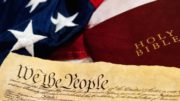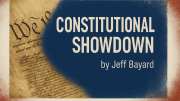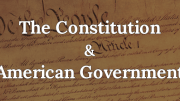In recent decades, the executive branch has grown by creating more government departments and agencies. This expansion shifted power away from Congress—the body we elect to represent us—and handed it to unelected bureaucrats. Initially set up to manage specific policies, these agencies have often exceeded their intended roles. Now, they create regulations that carry the weight of law, often without Congress’s direct approval.
Consequently, a “shadow government” has emerged. Unlike the officials we vote for, these agencies operate independently and, sometimes, in secrecy. This was not the vision the framers of the Constitution had in mind. The American people are left in the dark about what goes on inside these departments, with no say in the decisions being made. The Constitution intended for Congress to hold the power to make laws, ensuring that the people’s voice is heard.
Get Your FREE Pocket-sized copy of The Constitution and Declaration of Independence!
Click Here to get yours Today (Hillsdale Constitution Minute)
The Erosion of Constitutional Checks and Balances
When power shifts to these agencies, it weakens the principle of limited government, which is central to the American Republic. The Constitution created checks and balances to prevent any branch from becoming too powerful. Yet, these checks and balances erode when agencies operate without Congressional oversight. This erosion of checks and balances leads to government overreach and a concentration of power in the executive branch.
Many argue that this shift affects more than just power—it impacts our freedoms. As these agencies grow, they often do so at the cost of democratic accountability. When unelected officials have the power to create and enforce laws without transparency, it feels like a “shadow government” is threatening our liberties. The Constitution gave Congress the power to make laws to reflect the will of the people—not just a select few.
This perspective is rooted in a strong respect for the principles laid out by our Founding Fathers. Moving away from their vision is seen as a direct threat to our freedoms and rights. A primary purpose of the Constitution is to protect us from government overreach. Therefore, reclaiming power from these agencies and dismantling this “shadow government” is crucial for maintaining a free and just society.
The Series: Reclaiming Power
This blog series, titled “Reclaiming Power: A Constitutional Analysis of Government Weaponization,” will explore how the creation and growth of various government departments have led to their “weaponization.” This term refers to using government agencies to target political opponents, enforce certain ideologies, or expand their power beyond what is appropriate. We’ll examine how this “weaponization” and the rise of a “shadow government” contradict the principles of limited government, separation of powers, and the protection of individual rights.
Each part of this series will focus on a specific agency. We’ll explore how these agencies have drifted from their original purpose and what steps we can take to bring them back in line with the Constitution.
Part 1: Introduction to Government Weaponization and the Constitution
We’ll start by exploring the concept of “weaponization” within government agencies. Over time, these agencies have become part of a “shadow government,” operating independently and threatening the balance of power envisioned by the Founding Fathers.
Constitutional Focus: The Founders designed the separation of powers, checks and balances, and the protection of individual rights to prevent government overreach. We’ll show how the “weaponization” of government agencies undermines these protections and why reclaiming power back to the people is vital.
Part 2: The Department of Justice (DOJ) and the Rule of Law
The Department of Justice (DOJ) is supposed to enforce the law fairly. However, it has faced accusations of being “weaponized” to serve political agendas instead of upholding justice.
Constitutional Focus: We’ll discuss the importance of equal protection under the law and the need for an impartial judiciary. These principles are crucial to maintaining public trust and ensuring the DOJ operates within its Constitutional limits.
Part 3: The Federal Bureau of Investigation (FBI) and Due Process
The FBI is responsible for conducting investigations, but its actions are often seen as politically biased. This adds to the idea of a “shadow government” that operates without public oversight.
Constitutional Focus: We’ll emphasize the importance of due process rights and the protection against unreasonable searches and seizures. These Constitutional principles are essential to preventing the FBI from becoming a tool of “weaponization.”
Part 4: The Internal Revenue Service (IRS) and Equal Protection
The IRS enforces tax laws but has been accused of targeting political groups. This misuse of power contributes to the “shadow government” narrative.
Constitutional Focus: We’ll explore how equal protection under the law and the prohibition against using government power to target specific groups are vital to reclaiming power back to the people. These principles ensure that the IRS operates within its Constitutional bounds.
Part 5: The Environmental Protection Agency (EPA) and Property Rights
The EPA enforces environmental regulations, but there are accusations that it has been “weaponized” against specific industries, threatening property rights.
Constitutional Focus: We’ll examine how property rights are impacted and the limits of regulatory power under the Commerce Clause. Reclaiming these rights is critical to dismantling the “shadow government” and restoring Constitutional order.
Part 6: The Department of Homeland Security (DHS) and Individual Liberties
The Department of Homeland Security (DHS) was created to protect national security, but it has been accused of politically motivated enforcement actions that infringe on individual liberties.
Constitutional Focus: We’ll highlight the tension between national security and civil liberties, focusing on the Bill of Rights. Making sure DHS actions align with Constitutional principles is crucial to preventing the “weaponization” of security efforts.
Part 7: The Central Intelligence Agency (CIA), National Security Agency (NSA), and the Limits of Executive Power
The CIA and NSA gather intelligence, but their activities have raised concerns about surveillance and political influence, fueling the “shadow government” narrative.
Constitutional Focus: In this final part, we’ll explore the limits of executive power and the importance of checks and balances in preventing abuse. Upholding these Constitutional principles is essential to reclaiming power back to the people and ensuring that government agencies operate transparently and within their rightful scope.
Recommended Reading:
Hillsdale College Free Course: Constitution 101
The Constitution Minute Series (VCA)
Who’s Behind the Shadow Government (VCA)




